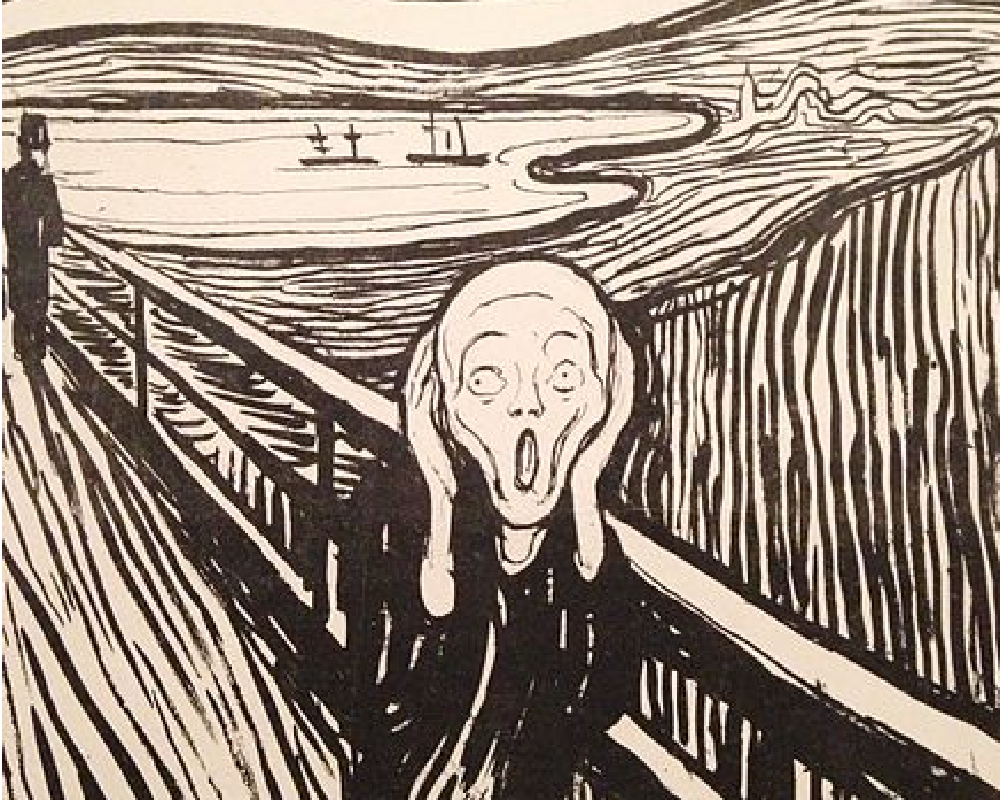Roughly nine years ago I found myself marooned in Melbourne for several months with no job and no money. I lived alone in a small closet in Toorak on the dole. When I wasn’t writing job applications or nervously attending interviews I studied a programming language called Java. I read a lot of books but generally felt uneasy about the nothingness that seemed to be happening to me exclusively.
On average I could afford to spend about twenty dollars per week for food, which obviously isn’t enough. But optimism drove me forward through those hard and hungry days, and I lived with great unfounded hopes for a better life. Anyone who has lived on weet-a-bix and water for weeks at a time understands the importance of great unfounded hopes.
It was around that time that I befriended Ruban. He was a student who stacked shelves at my local Safeway during the graveyard shift (a job I deeply envied, by the way) and we’d sometimes hang around late at night in the car park, smoking cigarettes and talking seriously about the seriousness of life. Because I was utterly broke, Ruban would roll up cigarettes for me to ration me through the next day. He was a very tall, lanky dark-skinned guy from an immigrant family. He was ethnically Australian, or first-generation Australian as we say. Ruban was black and I was white, which is why he called me Nigs and I called him Ruban.
This is a story that Ruban told me late one night while we were riding around in shopping carts in a carpark.
Over the previous Christmas holidays, which is summer in Australia, Ruban decided he needed to escape the city for a while, so he went off to stay with his parent’s house in a small town in the Australian Capital Territory. Through family connections he secured a summer job working night-shifts at the local abattoir, which is a fancy word that we Australians invented that sounds slightly better than slaughter house.
He described the particular hellishness of that job. He worked nights, usually until around three in the morning, standing in the same place underneath a conveyor of rotating hooks. Carcasses of cows would roll into the room and Ruban, on an assembly line alongside other men, each armed with their own sharpened knives, would dismantle the dead animal.
Now Ruban’s one task was hack the legs off the dead animal at its knees. Or whatever it is that experts call the knees of a cow. It doesn’t matter.
“Now Nigs,” he told me, “you get pretty expert at doing this stuff after a month or two. You have to strike the joint with a certain angle so it comes off cleanly with only one blow. When you do it right, the joint sort of explodes, and blood and marrow and shit sprays all over the place. It gets everywhere, all over your face and hair. You’d be covered in blood and skin and bits of everything. They give you protective eye wear and you really need it.”
“That could probably turn a man vegetarian,” I thought out loud, as anyone would.
“Well, it does sort of change your perspective on meat industry as a whole.”
“So, anyway,” I said.
“Anyway,” continued Ruban, “cleaning yourself afterwards was a matter to which one attended assiduously.”
I’m always impressed when people use words like assiduously; Ruban had been the top student in his high school through his final year.
“The worst thing,” he said, “was that sometimes the other guys would get bored and throw bits of intestines at you. They’d say your name, you’d turn around and then wack! You’ve got some gizzard in your mouth.”
“And these guys,” I said, wonderingly, “you never thought about stabbing any of them, say, in a fit of pique?”
Ruban was occasionally prone to fits of pique.
“I’d think about it, Nigs – I’ll admit it. I thought about it hard some times. But you’re in a room with guys who are pretty good with knives and they’ve all been doing it much longer than you have.”
“Fair enough,” I said, satisfied. We were both men of the world and we wouldn’t have survived this far if we went about intemperately teaching lessons in workplace etiquette to men who worked professionally with sharp knives.
Ruban eventually became accustomed to the gore and working through those awful, repetitive hours through the night he’d typically develop a fierce appetite. So immediately after work, he’d fire up a joint and head off on his skateboard along the side of the highway in the middle of the night, bound for home and a very late, hard-earned dinner.
Ruban was impressive on a skateboard: he seemed to be able to move from one side of Melbourne to the other and beat the traffic. Anyway, on this particular night out in the middle of nowhere he was really famished, so he made his way miles along the highway to the last, god-forsaken place you could buy food – a twenty-four hour petrol station. He kicked off his skateboard and stepped in through the glass doors into that cold, oppressive neon light that we all know and hate.
The man at the cash register stared at him blankly. Ruban nodded and said, “G’day mate,” but the man didn’t reply.
So Ruban went over to the hot food section and picked out a hot roast-beef sandwich, and if that doesn’t offer some indication of how hungry he was, I don’t know what else there is that I could say. He also picked out a carton of iced coffee because he and I practically lived on them in those days. I like to add superfluous detail when I’m telling a story because it makes readers impatient with me. I can’t really seem to help myself.
With his roast beef sandwich and his iced-coffee, he headed over to the front counter to pay. The cashier was still just standing there, looking at him emptily.
And my friend nodded at the man in that friendly, affable way of his and asked him how his night was going.
The man behind the counter gazed at Ruban and didn’t reply.
The thing about the general Australian experience, or perhaps Australians in general, is that we often have this tendency to chat amiably with strangers as if we have known them for years but just haven’t bumped into them recently. It’s something that disconcerts my American friends when they accompany me on visits home. So I’m not describing a situation that is normal. This situation was, in fact, eerie and unsettling. From a lifetime of cultural experience in Australia Ruban had every reason to expect some amiable banter from the man at the cash register. Or even a friendly shrug and a smile. But the man said nothing. He stared and said not a single word.
Ruban paused. He thought and reflected for a moment. And then he remembered that he was a black man of foreign appearance in a somewhat remote regional town.
He let out a sigh and felt himself crumple a little. What he felt was disappointment. He looked the man in the eye, looked this strange and silent white man right in the eye, and said:
“Really man?”
What else was there to say?
“Really? Is this really how it has to be?” And then he just shook his head. I knew that shake very well because Ruban could get animated in moments of strong emotion, even heightened states of disappointment in humanity.
And the man stood on the other side of the counter and said nothing in return.
“You know what?” said Ruban at last, defeated, “here’s the money, man. Here’s ten dollars. You can keep the change, you racist –” and then he said a word I won’t repeat because it was a bit tasteless. Everyone who knows Wrongcards knows that I don’t like to feature tasteless material.
(It wasn’t unusual for Ruban to suddenly tell a person to keep the change: he was overly generous with his money and always throwing it around as if it meant nothing to him. Undoubtedly this was because he had to work so hard to earn it).
Then, lifting his chin proudly, my friend wished the man good night and sauntered out of there like the situation didn’t matter to him in the slightest. He rode his skateboard home down the highway, through the deserted streets all the way to the home where he’d grown up.
“I admit I felt kind of sad, man. It’s like, people sometimes don’t see a person for what he really is. It’s like they just can’t look past, you know?”
I knew. Of course I knew. The world is a sad place and there are a lot of ignorant people out there who cannot seem to grasp how hurtful they’re being when they’re unnecessarily judging others.
Ruban no longer had any appetite. He crept carefully through the dark house carefully so as to not wake his parents, slipped into the bathroom and closed the door quietly behind him. He turned on the light, picked up his toothbrush and looked at himself in the mirror.
The reflection staring back at him was not what he expected.
He was covered in blood and skin and strings of flesh. A small rope of intestine still clung to his hair. Somehow he’d wandered out of the slaughter house forgetting to wash.
“So yeah,” he said to me, concluding his story, “it’s pretty easy to misjudge a person in this world.”
“It really is,” I agreed. It really made a man reflect.
And there we sat, on a curb in the darkness of the Toorak Safeway parking lot, thinking about life’s odd little lessons.
“The thing is, mate,” I said at last, “is that that guy… that cashier… after you left, you know what he did?”
“What?” my friend asked warily.
“Well – I don’t know how I know this but I just do, so you have to take all of this on faith, but all he did after you left was stand there. He stood there for hours staring at the spot where you’d been standing. He stood there right through that graveyard shift, immobile and unable to say a single word. When dawn came up he finally stirred and, staggering stiffly to the front doors, he turned off all the lights in the petrol station and locked the place up. Then he went home. Later that day, his boss would have received a call from the man’s wife. She would have explained that he could no longer come in to work and had decided to stay home and spend more time with his family.
“And I bet the man’s life was richer from that night onwards. I bet he is out there living his life more fully, and with greater appreciation for the simple joys of daily life. And my bet is that his wife noticed the change in him and feels closer to him in some indefinable way, though he has never told her about how close he feels he once came to being carved up by a blood-soaked psychopath in the dead of night.”
Ruban regarded me thoughtfully in the darkness. “Thanks man. I’m feeling a sense of closure on this issue. It’s been bugging me for months.”
“It’s cool,” I said. And it really was. I felt then, as I often do, that I have no other purpose in life than to change other people’s perspectives to more perfectly match my own. I like to think of it as gift, and not the trait of a deranged lunatic, as my ex-girlfriends have sometimes declared out of jealousy and ignorance.
“You know something,” Ruban said after a meditative silence, “you really should do something with that imagination of yours.”
“Yeah,” I replied. “I’ll probably get around to it one of these days.”



